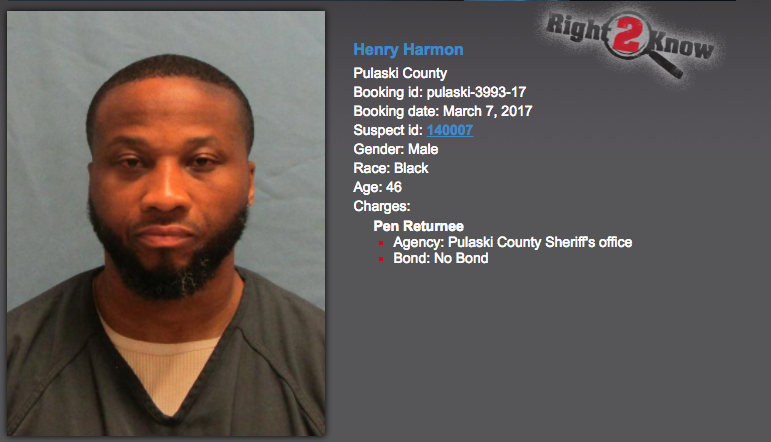A Little Rock man whose first-degree murder conviction and 105-year prison sentence were overturned on appeal accepted a 45-year sentence on lesser charges Wednesday rather than stand trial a second time.
Henry Alexander Harmon, 46, pleaded guilty to manslaughter and robbery as the seven women and five men who had been selected as jurors were set to begin hearing evidence against him.
Harmon's 105-year sentence did not allow parole, but under the arrangement negotiated by his attorneys, Toney Brasuell and Bobby Digby, he can apply for parole after serving 10 years of his new sentence, time that will be further reduced to about five years given that he's already spent 1,888 days (five years and two months) in prison.
Harmon declined an opportunity to address the court after the sentence was imposed. He had earlier complained that he was being framed for the killing by witnesses who were lying about him.
Deputy prosecutor Amanda Dillon told Circuit Judge Leon Johnson that the victim's family had been consulted on the plea deal and had endorsed it. Family members hugged her and detective Terrell Vaughn after the judge imposed the sentence.
Harmon testified at his November 2012 trial that he was too experienced a criminal to leave behind the incriminating evidence that Little Rock police used to link him to the January 2012 slaying of John Edward Williams during a robbery in the victim's hotel room at the Heritage House Inn on South University Avenue.
He was convicted then of first-degree murder, aggravated robbery and aggravated assault and sentenced to 105 years without parole as a violent offender.
But the Arkansas Supreme Court overturned his conviction the next year after finding Harmon had not been properly allowed to present his defense that another man had used Harmon's car and clothes and was the real killer.
Williams, 33, was killed by an intruder who burst into the hotel room where he and girlfriend, Christine Dyer, were sleeping and demanded money. Dyer had just received a $9,000 disability payment but it was in the form of a bank card, so the couple had no cash.
Williams was shot several times by the robber when he tried to fight the gunman. The robber also pistol-whipped Dyer, but she fled with her cellphone. She hid in some bushes and called police.
Officers arrived in time to chase the intruder's 1989 Lincoln Continental, but the driver eluded them. Police quickly found the car, still hot from the pursuit, and found some clothes next to it, including a leather jacket with what turned out to be the murder weapon in a pocket.
Williams' blood was found on the gun, a Colt .380-caliber Mustang Pocketlite pistol, the leather jacket, sweatshirt, glove, and bandanna collected by police. Harmon's DNA was found on the sweatshirt and bandanna.
Harmon testified in 2012 that the sweatshirt was his but denied ever wearing the bandana, saying it had been left in the car by a previous owner. He said that if his DNA was on the cloth, it must be because he used it on a cut on his hand.
Harmon told jurors that he had not had the car the night of the slaying because he had lent the Lincoln to a man named Cedric Johnson, who was interested in buying it. Johnson gave him $200 cash and $300 worth of crack to borrow the car, Harmon testified at trial. He said he never saw the car again.
Jurors were not told that on the bandanna and sweatshirt there were traces of the DNA of at least one other person, but the amounts were too small for forensic examiners to classify. The state Supreme Court ruled that the omission was significant enough to warrant a new trial.
The high court found that the judge had too strenuously applied case law that limits the introduction of exculpatory evidence by restricting the defense from disclosing the presence of the other DNA.
Metro on 03/09/2017


